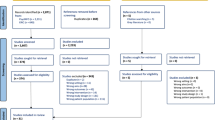Abstract
The study attempted a clinical evaluation of the efficacy of stress inoculation training for postoperative pain control using patients undergoing coronary artery graft surgery. A treatment group receiving stress inoculation training was compared to attention-education and no-treatment control groups. No differences were found between the groups on two pain rating measures, analgesic intake, or measures of state anxiety and depression. The ineffectiveness of stress inoculation in this study may be due to the difference between experimental and clinical pain, the multiple demands of the preoperative period, possible memory difficulties which some patients may have experienced, or the possibility that the procedure is not sufficiently potent for the intensity of this type of pain.
Similar content being viewed by others
References
Barber, T. X., and Cooper, B. J. (1972). Effects on pain of experimentally induced and spontaneous distraction.Psychol. Rep. 31: 647–651.
Beecher, H. K. (1959).Measurement of Subjective Responses: Quantitative Effects on Drugs, Oxford University Press, New York.
Coyne, T., and Peck, C. (1980). Pain and depression as a function of effectiveness of perceived control. In Peck, C., and Wallace, M. (eds.),Problems in Pain, Pergamon Press, Sydney.
Dlin, B. M., Fischer, H. K., and Huddell, B. (1968). Psychologic adaption to pacemaker and open heart surgery.Arch. Gen. Psychiat. 19: 599–610.
Genest, M. (1979).A Cognitive-Behavioral Bibliotherapy to Ameliorate Pain, Unpublished master's thesis, University of Waterloo, Waterloo.
Hackett, G., and Horan, J. J. (1980). Stress inoculation for pain: What's really going on?J. Counsel. Psychol. 27(2): 107–116.
Hackett, G., Horan, J. J., Buchanan, J., and Zumoff, P. (1979). Improving exposure component and generalization potential of stress inoculation for pain.Percept. Motor Skills 48: 1132–1134.
Hartman, L. M., and Ainsworth, K. D. (1980). Self-regulation of chronic pain: Preliminary empirical findings.Can. J. Psychiat. 25: 38–43.
Horan, J. J., Hackett, G., Buchanan, J. D., Stone, D. I., and Demchik-Stone, D. (1977). Coping with pain: A component analysis of stress inoculation.Cog. Ther. Res. 1: 211–221.
Janis, I. L. (1958).Psychological Stress, Wiley, New York.
Kirk, R. E. (1973).Experimental Design: Procedures for the Behavioral Sciences, 2nd ed., Brooks-Cole, Belmont, Calif.
Lubin, B. (1967).Depression Adjective Check Lists: Manual, Education and Industrial Testing Service, San Diego, Calif.
Meichenbaum, D. (1977).Cognitive-Behavior Modification, Plenum, New York.
Melzack, R., and Wall, P. (1965). Pain mechanisms: A new theory,Science 150: 971.
Over, R. (1980). Clinical and experimental pain. In Peck, C., and Wallace, M. (eds.),Problems in Pain, Pergamon Press, Sydney.
Speilberger, C. D., Gorsuch, R. L., and Lushene, R. E. (1970).Manual for the State-Trait Anxiety Inventory, Consulting Psychologists Press, Palo Alto, Calif.
Tan, S. Y. (1982). Cognitive and cognitive-behavioral methods of pain control: A selective review.Pain 12: 201–228.
Tan, S. Y., and Poser, E. G. (1982). Acute pain in a clinical setting: Effects of cognitive-behavioral skills training.Behav. Res. Ther. 20: 535–545.
Turk, D. C. (1975).Cognitive Control of Pain: A Skills Training Approach, Unpublished master's thesis, University of Waterloo, Waterloo.
Turk, D. C. (1977).A Coping Skills Training Approach for the Control of Experimentally-Produced Pain, Unpublished doctoral dissertation, University of Waterloo, Waterloo.
Turk, D. C., Meichenbaum, D., and Genest, M. A. (1983).Pain and Behavioral Medicine: Theory, Research and Clinical Practice, Guilford, New York.
Worthington, E. L., and Shumate, M. (1981). Imagery and verbal counseling methods in stress inoculation training for pain control.J. Counsel. Psychol. 28: 1–6.
Author information
Authors and Affiliations
Additional information
This study is based on a master's thesis by the first author, under the supervision of the second and third authors.
Rights and permissions
About this article
Cite this article
Postlethwaite, R., Stirling, G. & Peck, C.L. Stress inoculation for acute pain: A clinical trial. J Behav Med 9, 219–227 (1986). https://doi.org/10.1007/BF00848480
Accepted:
Issue Date:
DOI: https://doi.org/10.1007/BF00848480




